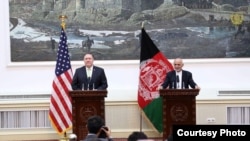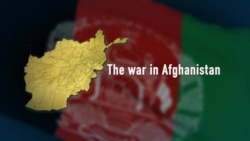The escalation between the United States and Iran over the killing of an Iranian commander now has sparked deep concerns about prospects for the peace process in Afghanistan, with officials and experts warning that Iran could collaborate with the Taliban to thwart American efforts in the war-torn country.
U.S. Secretary of State Mike Pompeo accused Iran Tuesday of attempting to build proxy networks in Afghanistan, asserting that Iran is trying to coordinate with the Taliban and its offshoot, the Haqqani network.
"Iran has refused to join the regional and international consensus for peace, and is, in fact, actively working to undermine the peace process by continuing its long global effort to support militant groups there," Pompeo said during his opening remarks at a rare State Department news conference.
The top U.S. diplomat warned that the "Taliban's entanglement in Iran's dirty work will only harm the Afghanistan peace process."
VOA reached out to Afghan officials who declined to comment on Pompeo's statement, citing the sensitivity of the issue.
Experts in both Kabul and Washington concur that Iran is likely to increase its outreach to the Taliban as part of its effort to retaliate against the U.S. for targeting Qassem Soleimani, commander of Iran's Islamic Revolutionary Guard Corps-Quds Force (IRGC-QF) in an airstrike last week.
"Tehran has a sky-high incentive to scale up arms support to the Taliban that enables the insurgents to push back against U.S. forces. It would be a relatively risk-free Iranian reprisal against the U.S.," said Michael Kugelman, director for the Asia Program at the Wilson Center in Washington.
Kugelman said Iran has a long history of aiding the Taliban in Afghanistan. A recent high-profile example of Tehran's support for the Afghan militants came last year when the Taliban staged a large-scale attack in the western Farah province, reportedly with material and assistance provided by Soleimani's Quds Force.
He said disturbing U.S. efforts to restore peace would be a viable option for Tehran officials as they determine responses to the deadly U.S. strike on Soleimani and other key Iranian officials.
"The only question would be the status of Taliban peace talks. If the Taliban has signed a deal with the U.S. and agreed to stop attacks on U.S. forces, then that makes it less likely to cooperate with Tehran," he told VOA.
The Afghan President Ashraf Ghani has publicly expressed concerns that Soleimani's death could turn his country into a battleground.
"We call on the Islamic Republic of Iran, our big neighbor, with whom we have extensive common language, religious, historic and cultural [values], and we call on the U.S., who is Afghanistan's strategic and fundamental partner, to prevent conflict escalations, and we hope that both sides solve their differences through negotiations," Ghani said in a statement last week.
Despite Ghani's ongoing efforts to keep Afghanistan out of the conflict, some analysts charge escalating salvos in the Middle East inevitably will disrupt the minimal progress made in the Afghan peace process.
According to Rebecca Zimmerman, a researcher on Afghanistan, "If Iran is looking for a way to respond to the U.S, without taking actions that could lead to war, Afghanistan is a place where it might be able to inflict pain while staying below the threshold of war."
Mohammad Jawad Rahimi, a U.S.-based Afghanistan political analyst, says the peace process is particularly vulnerable given Iran's leverage on certain members of the Taliban.
"I don't believe that all the Taliban listen to Iran, but definitely some of them who are receiving Iranian support will be used against the U.S.," said Rahimi, noting adding that Taliban leaders in the past repeatedly have traveled to Iran and received military support from Tehran.
"In 2016, Mullah Akhtar Mohammad Mansoor spent two months in Iran and on his way back to Pakistan, he was killed by a U.S. airstrike. An Iranian passport and other documents were found in his pocket. Last year, the Taliban delegation, including Mullah Beradar, traveled to Iran and met with Iranian Foreign Minister Jawad Zarif and other Iranian officials. One of their main agenda items was to stop the U.S.-Taliban negotiations. The meeting between the two sides was confirmed by the Taliban's spokesman and Iranian officials," Rahimi told VOA.
The Afghan peace process has gained some momentum since late 2018 in an effort to end nearly 19 years of ongoing war in Afghanistan. The process, involving direct U.S. talks with the Taliban, seeks to reach an agreement that begins intra-Afghan peace, followed by the withdrawal of U.S. troops from the country.
VOA's Muhammad Habibzada from Washington contributed to this story.







